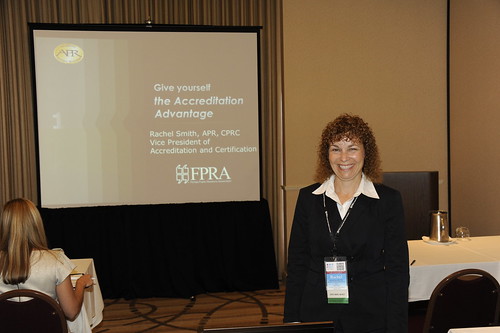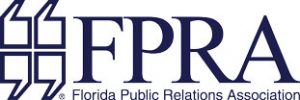
Give yourself the Accreditation Advantage – Sounds good to me since I want any advantage I can get! For anyone who is interested in gaining their accreditation, here is what I learned in today’s session.
Universal Accreditation is a voluntary program that allows each individual to demonstrate their proficiency in public relations through a standardized written exam following advancement from an oral readiness review.
Why become accredited?
- APR designation shows your knowledge, skills and abilities in public relations
- APR is a symbol of professionalism, experience, and ethical judgment in PR
- Credibility
- Career Advancement
- Commitment to public relations career and profession
- Personal achievement – It is a source of pride
Since accreditation defines the profession by setting standards, legitimizing public relations and building accountability, then it only makes sense that there would be a test. The APR tests each candidate on their knowledge, skills and abilities or KSA’s.
The APR tests individuals on the following KSA’s:
- Research, planning, implementing, and evaluating programs
- Ethics and Law
- Communication models and theories
- Business literacy
- Management skills and issues
- Crisis communication management
- Media relations
- Using information technology efficiently
- History and current issues of public relations
- Advanced communication skills
In order to become accredited, public relations professionals must be a member of FPRA and have a minimum of five years experience. Once you’ve met these criteria you can move forward with the process. You will want to start out by reviewing the APR details on www.praccreditation.org. It has everything you need to know about the accreditation process in one convenient location. Next, talk with your local chapter APR Chair and see when you can sign up for the APR classes. Here is a brief outline of how the process should play out.
- Review the www.praccreditation.org site
- Talk with local APR Chair about APR classes
- Once you sign up for the APR classes you can apply for eligibility by paying your $25 application fee and by filling out this form located at http://www.praccreditation.org/documents/APRapplication2010.pdf
- Seek coaching support from your local APR Chair
- Purchase the textbook: Effective Public Relations by Cutlip, Center & Broom (price varies)
- Sign-up for the online study course (http://www.praccreditation.org/Preparation%20Sources/index.html) if you decide you want the extra assistance. The course costs around $195.
- Participate in local study groups
- Complete the Readiness Review Questionnaire located at http://www.praccreditation.org/Forms.html
- Create a portfolio about a campaign or project (a lot like creating an Image Awards entry)
- Present your portfolio to your 3 person Readiness Review panel. The presentation takes about one hour of your time and the panelists will let you know if you can advance to the computer based exam.
- If you advance, you’re ready to take the multiple choice computer based exam. The cost for this exam is $385 (FPRA offers a $100 rebate and most local chapters offer a rebate upon members passing). The test is comprised of 188 questions and you need at least a 67 to pass. You get 3 hours and 15 minutes to take the test and at the end of the exam you will receive either a pass or fail notice with your grade. You won’t receive any information on the items that you missed or what you got correct. Good advice: leave your first answer and go with your gut!
You can take the test at any Sylvan testing site in your area, but I would suggest talking with your local chapter APR Chair about the closest testing center. The study classes typically start in September and candidates are ready to take on the Readiness Review Questionnaire by January. It’s a 6-month process that requires you to commit 3-6 hours of your week towards reading and studying the APR information. It is a lot like being in a college class all over again.
Last, but not least is the maintenance factor. Every three years APR’s have to prove that they are continuing to learn about their profession through continuing education efforts like attending the FPRA Annual Conference.
I’m planning to get my APR at some point in the near future and I’m glad I attending this session because it offered a ton of insight into what the process entails. Now I feel more confident about the details and think that I can make a better decision about when and why I’ll start prepping for my APR. If you’re still on the fence about your APR then this video might just push you into action. Take a look at this link: https://www.fpra.org/Professional_Development/APR.aspx
Rachel Smith, APR, CPRC, VP Accreditation & Certification is the Communications Director for the Division of Vocational Rehabilitation for the Florida Department of Education. She has more than 20 years of public relations experience and is responsible for the development and implementation of all internal and external communications for the agency.
